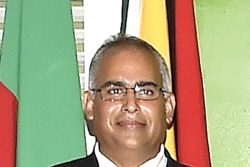The President’s New Year address for 2023, replete with grand promises and projections for “transforming” Guyana, included his declaration that government intended to “step on the accelerator” with regard to the country’s growth and development. These sorts of speeches are expected as an old year rolls into a new one; they are designed to offer hope and therefore should not be found wanting or mired in obfuscation. Perhaps President Irfaan Ali and/or his speech writers should have applied the brakes a bit – assuming they are working – and taken cognisance of this, particularly given the fact that other pledges made in previous speeches are yet to attain fulfilment.
President Ali had dubbed 2021 ‘the year of recovery’ in his New Year address two years ago. Claiming that the business community had reported a better performance during Christmas 2020 than the five previous Christmases, he stated that it was due to “more money in circulation and more disposable income in people’s pockets than our country has witnessed in a long time”. No member of the business community directly challenged that statement. However, many had lamented that the then raging Covid-19 pandemic had curtailed Christmas spending.
Further, President Ali had said his government was committed to improving the fortunes of every Guyanese in 2021 through equitable distribution of the country’s “bounty”. One can safely assume that he was referring here to Guyana’s ‘oil wealth’. Proclaiming “we must not remain a rich country of poor people…” and that “the standard of living and the quality of life must be lifted for all,” he vowed that opportunities for individual employment would be created. He added that communities which were at a disadvantage because of their geographic location would have their needs assessed in order to identify solutions and implement plans to change their circumstances.
Unfortunately, things did not pan out as projected in that speech. There were one-off distributions of Guyana’s bounty, that were controversial in their lack of equity. Among the most memorable was the $25,000 ‘Covid’ grant, which was given to some who did not need it and inaccessible to others who did. Then there was the $250,000 handout to around 7,000 sugar workers who had been severed when the estates where they worked were closed under the previous administration. The handouts continued into 2022.
Towards the end of 2021, government imposed a seven percent pay rise on public servants without attempting to engage the workers’ unions. In the face of skyrocketing cost of living the imposition was clearly at odds with President Ali’s New Year vow to lift the quality of life and standard of living of all citizens. Worse, when the unions accused the government of breaking the law by bypassing the collective bargaining process, the President attempted to defend the imposed pay hike claiming it was best for public servants and charging that the unions were being political.
In his New Year address for 2022, President Ali had announced that government employees would receive more scholarships as a way of creating new opportunities for local young professionals to manage “all sectors of our society”. He also divulged his intent to meet organised groups of young people, “including the youth arms of all the political parties, starting as soon as these can be arranged. I want to hear their views; I want to learn how they think we should shape the future of our One Guyana…”
In reality, there was no indication that anything more than the usual scholarships were on offer to government employees throughout the year. The US-based, international Coursera initiative, through which both free and paid online learning could be accessed, had been ‘offered’ by the Ministry of Education in September 2020. However, Coursera has been widely available to anyone seeking online education since 2012. Meanwhile, if President Ali did sit down with youth groups, particularly those with a political leaning, it has been a closely guarded secret.
This year’s promises are the grandest yet. Among other things, President Ali vowed that there will be “transformative” improvements in roads, drainage, community development, agriculture, health and education. To his catchphrase ‘One Guyana’ he has added ‘shared prosperity’ and ‘post-2030 state’, indicating that the advancements promulgated to start this year will all be wrapped in a box, tied with a bow and presented to the Guyanese public by that time. The President also touched on crime and security. Not content to merely promise change for the better in that sector in the year ahead, he boasted that the investments made in public security during 2022 had led to a 19% decrease in serious crime, which was “the lowest reported rate for such crimes in a decade”. Interestingly enough, a look back at statistics released by the Guyana Police Force revealed that there was in fact a 19% reduction in serious crime reported in May 2016. The police also reported a 20% decline in serious crime in September 2021. Clearly, no one checked the facts, or perhaps the truth is that they don’t matter.
To hype transformation when many do not make a living wage; when teachers and nurses are still not being paid their worth flies in the face of the equity the President says he stands for. Yes, the indications are there that the government is indeed on the accelerator, especially based on what is happening in the oil industry. Unfortunately, this appears to be a runaway train that is not taking everyone along.






